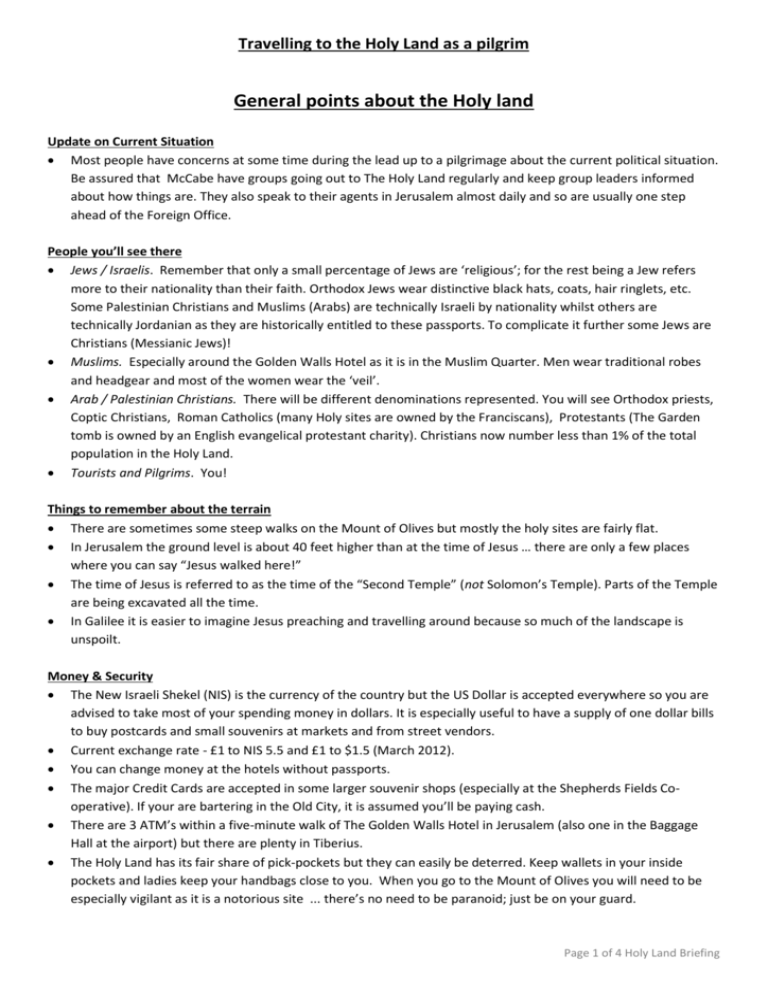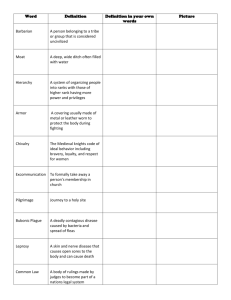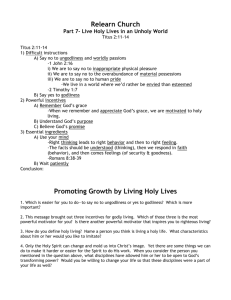General Hints on Travel to the Holy Land for first time Pilgrims
advertisement

Travelling to the Holy Land as a pilgrim General points about the Holy land Update on Current Situation Most people have concerns at some time during the lead up to a pilgrimage about the current political situation. Be assured that McCabe have groups going out to The Holy Land regularly and keep group leaders informed about how things are. They also speak to their agents in Jerusalem almost daily and so are usually one step ahead of the Foreign Office. People you’ll see there Jews / Israelis. Remember that only a small percentage of Jews are ‘religious’; for the rest being a Jew refers more to their nationality than their faith. Orthodox Jews wear distinctive black hats, coats, hair ringlets, etc. Some Palestinian Christians and Muslims (Arabs) are technically Israeli by nationality whilst others are technically Jordanian as they are historically entitled to these passports. To complicate it further some Jews are Christians (Messianic Jews)! Muslims. Especially around the Golden Walls Hotel as it is in the Muslim Quarter. Men wear traditional robes and headgear and most of the women wear the ‘veil’. Arab / Palestinian Christians. There will be different denominations represented. You will see Orthodox priests, Coptic Christians, Roman Catholics (many Holy sites are owned by the Franciscans), Protestants (The Garden tomb is owned by an English evangelical protestant charity). Christians now number less than 1% of the total population in the Holy Land. Tourists and Pilgrims. You! Things to remember about the terrain There are sometimes some steep walks on the Mount of Olives but mostly the holy sites are fairly flat. In Jerusalem the ground level is about 40 feet higher than at the time of Jesus … there are only a few places where you can say “Jesus walked here!” The time of Jesus is referred to as the time of the “Second Temple” (not Solomon’s Temple). Parts of the Temple are being excavated all the time. In Galilee it is easier to imagine Jesus preaching and travelling around because so much of the landscape is unspoilt. Money & Security The New Israeli Shekel (NIS) is the currency of the country but the US Dollar is accepted everywhere so you are advised to take most of your spending money in dollars. It is especially useful to have a supply of one dollar bills to buy postcards and small souvenirs at markets and from street vendors. Current exchange rate - £1 to NIS 5.5 and £1 to $1.5 (March 2012). You can change money at the hotels without passports. The major Credit Cards are accepted in some larger souvenir shops (especially at the Shepherds Fields Cooperative). If your are bartering in the Old City, it is assumed you’ll be paying cash. There are 3 ATM’s within a five-minute walk of The Golden Walls Hotel in Jerusalem (also one in the Baggage Hall at the airport) but there are plenty in Tiberius. The Holy Land has its fair share of pick-pockets but they can easily be deterred. Keep wallets in your inside pockets and ladies keep your handbags close to you. When you go to the Mount of Olives you will need to be especially vigilant as it is a notorious site ... there’s no need to be paranoid; just be on your guard. Page 1 of 4 Holy Land Briefing Food and Water The food is delicious but different! Ease yourself in gently and don’t eat too much too quickly! The water in the hotels will be O.K. for brushing teeth but drink bottled water to be on the safe side. The guide will tell your group how safe each place is for drinking water. The Golden Walls Hotel in Jerusalem doesn’t have tea and coffee making things in bedrooms so if you fancy an early morning cuppa you’ll have to take your own travel kettle, cup, tea, etc. The Ron Beach, however, does have kettles, etc. in their rooms! Bottled water should be available for sale on coach at a reasonable price – you just pay the driver. Otherwise there are shops near the hotel in Jerusalem where you can buy big bottles cheaply. Water is a scarce resource in the Holy land so please don’t waste it – turn off taps, etc. What to wear You won’t need to take many smart clothes although sometimes it’s nice to smarten up for dinner. You must not wear shorts at the holy sites / churches and women must cover their shoulders and their legs above the knee (women might prefer to take a light shawl to cover shoulders so that they can still wear slight t-shirts). There will be a few days when shorts are O.K. but you’ll be advised the day before. You are on an air conditioned coach when you travel around - this is sometimes ‘pleasantly cool’ and you might need a light jumper! In the summer months, make sure you pack swimwear for the Dead Sea day and the swimming pool and Sea of Galilee at the Ron Beach Hotel in Tiberius. Take good walking shoes with you - a strong pair of sandals will be fine. Gratuities Tipping is the norm in The Holy Land and is expected by guides, hotel staff, drivers, etc. (groups also normally leave a small donation at churches where they hold worship). Groups leaders operate a common fund and will pass the tips on (tips for the fund are usually collected on our first day) Passports This must be valid for six months after our return to the UK. Check now! McCabe currently recommend that you have your passport stamped on arrival in Israel, which is the same advice given by the Foreign Office. Although there is an option not to have it stamped, those asking for this option have often been kept waiting longer at Immigration/Security in Tel Aviv and subsequently had problems getting in and out of the Palestinian Authority (Bethlehem). If you have any stamps in your passport with Arabic script on you may be asked questions about them at the airport. If this happens, simply answer that you were there on holiday (or business, if this was the case). In the past group leaders were advised to collect all passports and deposit them in the hotel safe; however, now that most hotels have good personal safes in rooms you will be asked to look after your passport yourselves. You will need to remember to take them with you on the Bethlehem day and on changeover day! All embassies are in Tel Aviv, not Jerusalem, and obtaining a replacement passport involves a trip there and potentially a long wait so do keep your passport safe! The Local Guide Your local guide usually stays with the group throughout the pilgrimage. All guides are very well trained and highly knowledgeable about the history of each site. You might need to stand close to him/her if you are hard of hearing … don’t be shy – push to the front! Sometimes the guide and driver offer an extra excursion during our stay in Jerusalem; it is a coach tour of the city by night and usually costs £15. Airport Security Procedures Page 2 of 4 Holy Land Briefing Check In at Heathrow : an El Al representative will talk with each of you as you queue for the check in desk. They will ask questions about who you know on the trip, ask if you are taking anything for anyone, etc. It is not threatening but El Al take security very seriously so you should have great confidence when flying with them. A McCabe representative will meet you at the airport to help you through all this. At tel Aviv, once through Customs your group will be met by a staff member of staff from Albina Tours, McCabe’s representatives in The Holy Land, who will welcome your group to The Holy Land. Check In at Tel Aviv : This procedure will be much more rigorous at Tel Aviv when you leave – where your bags are scanned before check in and often some are asked to open their bags for further checking. This process can be very long and you might be kept standing in a queue for up to two hours so be prepared. Your passports will be checked at several check point places on your way to the departure gate so have it handy at all times. You can pack liquids in your hand luggage at Tel Aviv (honey, wine, etc.) Because of these checks you have to be at both airports 3 hours before the flight leaves. Shopping and Souvenirs There will be various stops for shopping. The guides usually take groups to shops of people they know; don’t feel obliged to buy! You can also barter for gifts in the ‘souks’ or from street vendors. It’s very important that you don’t hold the rest of the party up bartering down that extra shekel or dollar! In Bethlehem (Shepherd’s Fields) there will be a stop at a Christian co-operative shop. Olive wood carvings can be a nice memento, but they also sell a variety of small souvenirs, gold and silver jewellery of differing qualities and prices. This is an excellent place for souvenirs. There will also be a stop in Jericho to a shop which sells wonderful Hebron glass (which can confidently be shipped home) as well as a good selection of ceramics, Dead Sea cosmetics, dried fruits and honey. The shops in Tiberius are not that exciting for souvenirs so it’s best to get things as you see them on the way round rather than leaving it all to the last day!. Coach drivers tend to have a sideline in souvenir goods which many have found to be excellent value. These include books at £10 or $15 and DVD’s / CD sets at £17 or $25. (prices as at March 2012) Health There is no need to get inoculations for travel to the Holy Land(but make sure your tetanus and polio are up to date). However do check with your own GP as recommendations change all the time and it appears that advice differs from surgery to surgery. The summer months see very hot weather so make sure you drink plenty of water. You can buy bottled water everywhere, and always take a bottle out each day. A sun hat and sunglasses are essential; so is a good sun-screen which must be applied regularly. You will be in the shade (or inside cold churches) much of the time but tell me if you are becoming too hot! The coach is always cool, as are most restaurants and both hotels. If you have an upset stomach then fizzy drinks (but not fruit juice) are very good. Some Insect Repellent spray is useful although you probably won’t encounter many when you are there. Take a small First Aid kit with you. Things to pack include : Imodium or similar for upset stomachs, Dioralyte (replacement of salts, sugar, etc.), paracetamol or ibuprofen, plasters and an antiseptic cream. If you are on any sort of prescription medication - take enough to last the trip! There are chemists in the vicinity which sell most things and if you are taken ill when away don’t worry, as a good doctors are available and can be contacted very easily through the hotels. Page 3 of 4 Holy Land Briefing Specific points about your programme General Outline of Days Breakfast is usually from 7.00am Leave hotel at around 8.00 a.m. Morning Tour- 8.00 a.m. to 12.30 p.m. Lunch Break - 12.30 - 2.00 p.m. Afternoon Tour - 2.00 - 4.30 / 5.00 p.m. The hotels prefer groups to come down to dinner at around the same time; this is agreed beforehand. Evenings are free. You can safely walk around the vicinity of the hotels in Jerusalem and Tiberius and both have pleasant bars and terraces in which to sit and chat. Worship You will have a variety of worship times during your time away. Some are likely to be services of Communion, but at each site there will usually be a reading and/or a time of prayer or reflection, lead buy your own group leader. You will be sent a hymn book which you will need to take out each day as you tour around. Page 4 of 4 Holy Land Briefing








